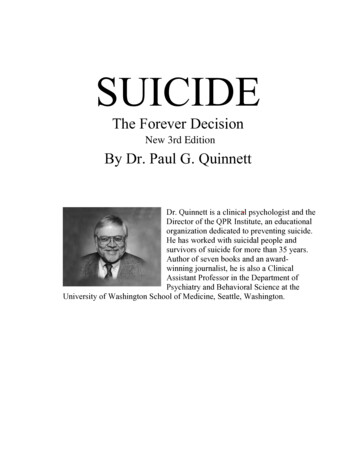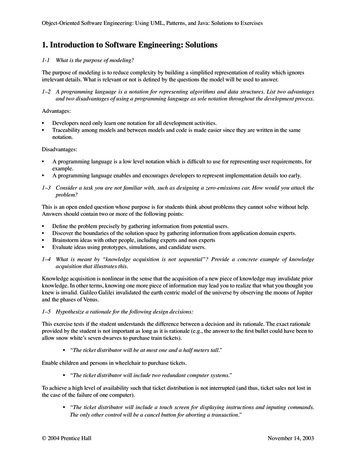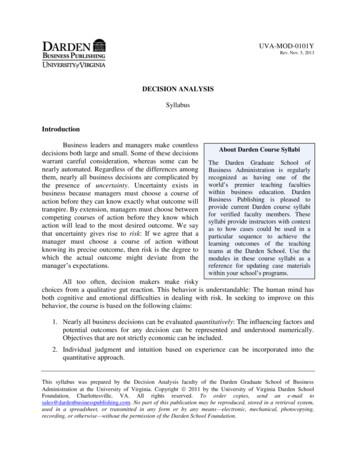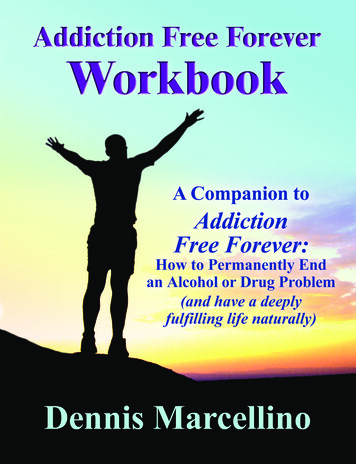
Transcription
SUICIDEThe Forever DecisionNew 3rd EditionBy Dr. Paul G. QuinnettDr. Quinnett is a clinical psychologist and theDirector of the QPR Institute, an educationalorganization dedicated to preventing suicide.He has worked with suicidal people andsurvivors of suicide for more than 35 years.Author of seven books and an awardwinning journalist, he is also a ClinicalAssistant Professor in the Department ofPsychiatry and Behavioral Science at theUniversity of Washington School of Medicine, Seattle, Washington.
Compliments of the QPR InstituteSuicide: the Forever DecisionFor those thinking about suicide and for those who know, love and counsel them.DISCLAIMERBoth author and publisher wish the reader to know that this book does not offermental health treatment, and in no way should be considered a substitute forconsultation with a professional.The identities of the people written about in this book have been carefullydisguised in accordance with professional standards of confidentiality and inkeeping with their rights to privileged communication with the author.
TABLE OF CONTENTSINTRODUCTIONIntroduction .5CHAPTER1You Don't Have to Be Crazy.7CHAPTER2An Idea That Kills . 11CHAPTER3Don't I Have a Right to Die?. 13CHAPTER4Are You Absolutely Sure?. 19CHAPTER5One Step Back, Please. 25CHAPTER6The Bug in the Cup . 27CHAPTER7Loneliness . 31CHAPTER8The Good News About Depression. 39CHAPTER9Angry Enough to Kill Yourself? . 45CHAPTER10Maximum Stress . 50CHAPTER11Too Hopeless to Hope. 58CHAPTER12Drugs, Booze, and Fatal Mistakes . 67CHAPTER13They Won't Love You When You're Gone, Either . 72CHAPTER14For Those Who Have Tried . 79CHAPTER15What If You Don't Succeed?. 83CHAPTER16The People You Leave Behind. 87CHAPTER17Time Heals . 92CHAPTER18Getting Help . 94CHAPTER19A Philosophy of Life . 101EPILOGUEEpilogue . 1051
INTRODUCTIONDear Reader;I don't know who you are or why you are reading these words. I only know that you have pickedup this book and, for the moment, you are reading it. It is my hope that if you need this book,you will continue to read it.As an author, it would help me a great deal if I knew more about you. But I don't and, unless wemeet sometime someplace, we can never know one another. So we are stuck right here in thebeginning. We are strangers and that is the way things will be between us. But this should notstop us. At least it will not stop me.I am going to write this book directly to you, as if you were sitting with me in my office. Myoffice is a warm room. It is quiet and private. We have comfortable chairs and the phone doesn'tring. No one will disturb us in my office. It is the office in which I do what psychologists oftendo-listen to people, talk with them, and try to help them with life's problems.At the outset I must assume a couple of things about you. And while it is dangerous to makeassumptions about people, because of our relationship, I will have to do it. I will assume thatbecause you are reading this book, you have thought about taking your own life, or that you havealready attempted to do so. Either way, I will assume you are greatly troubled and that you haveconsidered ending your life.Assuming this to be true, I am going to talk to you about the pain of living and the consequencesof dying, so far as I know about them. I am going to talk to you about suicide. And because yourlife is at stake, I am not going to fool around. I am not going to kid you. I am not going to mincewords. Rather, I intend to be just as honest and straightforward as I know how to be.And because I have known many people who have wanted to kill themselves and too many whohave, I have some idea of what kind of mood you are in at the moment. I know you may not beup to reading a book. But maybe you could read this one. I will keep it short.One of the reasons I have written this book is that suicide is an unpleasant topic. People do notlike to talk about it. They do not like to hear that another human being is so troubled that he orshe is considering self-destruction. But this silence is not good for us. It is not good for thetroubled person and it is not good for those of us who may wish to avoid the fact that someonewe know is so desperate and so alone that ending his or her life seems the only solution. It istime we talked, and talked candidly.Some people may argue that a book of this kind should not be written and that, somehow, talkingplainly about suicide will increase the chances that a reader may die by suicide.I do not believe this is true, and several research studies support my opinion.Rather, it is my feeling that the more we learn about dying, the more we learn about living. And,when we have learned more about both, maybe we are better able to fully live all of the life wehave left to us.Another reason I have written this book is that many people kill themselves without everknowing that help was just phone call away. You wonder, in this modern age, how this can be.But it is true. So maybe this book will find its way into the hands of someone who never knew2
help was there and where to find it. Maybe this book will give someone that little bit of couragethey need to ask for that help, or to hold on for another day or another week or until their lifechanges for the better and the thoughts of suicide begin to fade.Just one more note.I do not have any magic answers or quick solutions to life's problems. I don't think anyone does.So I won't offer you any easy ways of living or simple solutions to the pain and suffering thatseem to be a part of all our lives. But because this book is about suicide and nothing less thanyour life is at stake, I won't apologize for what I have to say to you that you may not like. For allI know, this book may be the last thing you ever read.Paul Quinnett3
CHAPTER 1YOU DON’T HAVE TO BE CRAZYThe first thing I want to tell you about suicide is that you don't have to be crazy to think about itor, for that matter, even to try it. Suicide is a solution. No matter what anyone tells you, suicidedoes solve problems, at least your problems. And if you succeed, it solves them once and for all.As you have no doubt already figured out, once you are dead nothing can hurt you anymore.Once you are dead you are beyond feeling bad. Once you are dead you can't possibly care whathappens anymore. Whatever pain you are in, it will end just as soon as you stop breathing. Sincethere is no point in kidding each other right here in the beginning, I won't argue with you thatsuicide doesn't work. It does. Or at least it seems to.Before this time in your life, my guess is that when you heard people say they felt like killingthemselves, you thought they were crazy. Now, if you are in that same place, maybe you can seehow they felt. For whatever reasons people think it, most of them will say you are crazy forthinking about suicide. Or, if you kill yourself, they will say you must have been crazy to havedone it.But the truth is that most people who kill themselves are not mentally ill, at least in the way wethink of people who are “out of their minds.” Yes, people who are psychotic sometimes killthemselves, but most people who die by suicide are people just like you and me; people who, forreasons I hope you will explore with me, have decided that life is just not worth living anymore.The great majority of people who attempt or complete a suicide are so sad or hopeless or angrythat they simply can't stand life anymore. Or they have been dealt such a terrible blow by life thatthey are overwhelmed and can see no other way to end the feelings of loss, stop the suffering andregain control over their future. But they are not crazy. And, most likely, neither are you.Later in this book I will talk in detail about depression, loneliness, anger, hopelessness, stress,and how these states of mind can influence us and trigger our thoughts of suicide. But for themoment I encourage you to try to read the book through from front to back so that you willunderstand the hows, the whys, and all the risks and consequences of trying to kill yourself.One of the things that happens when you begin to think about suicide as a way out is that youbegin to feel better, sometimes a little better, sometimes a lot better. After all, when you've beenstuck with a problem for which there seems to be no answer, finally finding one is a great relief.You might ask, "How can this be?"Because we humans are capable of imagining doing things we have never done or being inplaces we have never been, we are all capable of imagining what it might be like to be dead, or atleast what it might be like not to be alive. Only man is capable of imagining his own death. Wecan play our death out like a role in a movie. We can close our eyes and see ourselves lyinglifeless in a casket. Whether we will admit it or not, just about all of us at some time or another,have imagined what it would be like to be dead.It is this powerful ability to imagine an end to our problems that makes thinking about suicidepossible. And it isn't like anyone can stop us from thinking about taking our own lives. It is ourmind, our imagination, our ability to anticipate what death might be like that makes us humanbeings and no one, but no one, can stop us from being human.4
From my point of view you have every right to think about suicide as a way to solve whateverproblem you are dealing with right now. Suicide is a decision every single human being cancontemplate. And for some people, in some circumstances, suicide might be the rightdecision. What people and under what circumstances is not for me to say.So for now, for this moment between us, I'd like to put the suicide decision on the shelf and askyou to stay with me for the rest of this book. As you can guess, I'm not writing this book to hurryanyone along. Rather, I'm writing this book to help you examine suicide in some detail andmaybe in some ways that haven't yet occurred to you.I have one other belief I need to share with you right now. That belief is simply this: Every timeany of us has to make a decision, we always make the very best decision we can. None of usstarts out to solve a problem and says, "I think I'll make a lousy decision this time." In my view,this never happens. What does happen is that each time we have to make a decision, we take allthe available information we have, run it through our little brains and then, sometimes crossingour fingers, we decide what we will do. And herein lies the problem.What if we didn't have all the information necessary to make a really good decision?How many times have you looked back at a decision you made and said, "Gee, I shouldn't havedone that. I didn't know it would turn out that way. How could I have been so stupid?"If you are like me, then you've done this little trick hundreds of times, maybe thousands. No onehas a corner on the stupidity market and making decisions you later regret is just part of beinghuman.Among other things, life requires that each of us make decisions, hundreds of them each day.There are little decisions like what to wear to work or school each morning, and big decisionslike what to do in life, whom to marry or whether, when things are going badly, even to go onliving. Everyone has to make the same decisions. The trouble is that we never seem to have allthe information we need to make the best possible decision every single time. If we did, we'dmake perfect decisions. But since we don't, we keep on making imperfect decisions, decisionsthat we later regret. Frankly, I don't see anyway out of this for any of us.But there is hope. As people get older they generally get a little smarter. They get a little smarterbecause the longer they live, the more information they have and the better the decisions theytend to make. Think back to when you were a kid. Think back to a decision you made that, givenwhat you know now, you would never make again.For example, if you are a smoker, given what you now know about smoking, would you havetried that first cigarette? Probably not.Or maybe you got into a fight with a best friend or a parent and decided never to speak to themagain.Would you act in exactly the same way today? Maybe not.The point is, we can all look back and regret some of our decisions. We can all look back and seethat we were stupid, or maybe ignorant is a better word. Ignorance (not having all the facts) iswhat most of us are most of the time.5
But this is okay with me.I don't mind being ignorant. I don't like being embarrassed because I don't know something, butthen nobody ever promised me I'd always know everything I needed to know when I needed toknow it. And, unless you got a different guarantee than I did, I don't imagine you're any betteroff.But I think we can, all of us, hope that each day we will get a little smarter. And I have alwaysfelt that if I can look back at some dumb decision I made and say to myself, "Paul, that was astupid decision," then at least I'm not getting any dumber.So what has all this to do with suicide? What it has to do with suicide is this: when people startthinking about ending their own life, they generally don't have all the facts. Since the majority ofsuicidal people are depressed and not thinking clearly, they may think they have all the facts, butthey don't. And, because suicide is such a permanent solution and one you can't go back andremake, then for your own sake, perhaps you ought to make the decision only after you’refeeling good again and then only after you have considered all the facts.And I mean every single one.One thing I have learned from people who have thought about suicide and finally decided to do itis that once they've made their mind up, they suddenly feel better. In fact, some of them havetold me they feel wonderful. "Now I know what to do!” they have said.And this is exactly what happens to any of us once we have finally found a solution to a problemwe've been struggling with. It is as if we have set down a huge burden and, in setting it down, wefeel a great relief.But just one minute. Sure, suicide will stop the hurting. Suicide will make all the problems goaway. Suicide will end the nightmare that living has become. But is it really as simple as all that?Isn't it a bit scary? And isn't it awfully final?You might think that last question is a silly one.Of course suicide is final. But you might be surprised to learn that the younger a person is, theless he or she knows about death and the finality of death. But the older you get, the more deathyou see and, in the process, you come to know that a suicide attempt that ends in death is truly afinal decision.As a friend of mine who works with suicidal young people recently said, "Some kids thinksuicide is a fad. They have a big problem and they say, 'I think I'll try suicide this week. If itdoesn't work, I'll try something else next week.'"Next week!If I have a job ahead of me in this book it is, more than anything else, to convince you that whatlooks like a quick and easy solution actually isn't all that quick and easy. As often as not, suicideis a complicated, messy business and creates as many problems as it solves.True, you don't have to be crazy to think about it or maybe even try it but, if you'll forgive thejoke, suicide can be dangerous to your health.6
CHAPTER 2AN IDEA THAT KILLSWhat I want to talk to you about in this chapter is just where you got the idea of taking your ownlife in the first place. It didn't just pop into your head one day from out of nowhere. But since Ican't ask you where you got the notion, I'm going to have to do my best to help you figure thisout for yourself.Take a minute right now and ask yourself, "When did I first start thinking about taking my ownlife?"Now ask yourself, "Have I known anyone who died by suicide?"Because human beings learn a great deal from each other, all of us are subject to examples set forus by people we know, by strangers, and by famous people. We learn which fork to pick up at aformal dinner by watching the person next to us. We learn what to wear to the dance by watchingwhat other people wear to dances. Most of us cut our hair long or short, depending on what mostother people our age are doing with their hair.For those of us who live in America, we all know Marilyn Monroe died by suicide. We know thenovelist Ernest Hemingway killed himself. We read about people killing themselves all the time.And sometimes we think, "If someone like Marilyn Monroe, with all her beauty and money andsuccess, can kill herself, why shouldn't I?"Or maybe someone in our family died by suicide. If one of our parents died by suicide, then wemight well ask ourselves, "If dad couldn't take it, how can I?"Or maybe one of our best friends died by suicide. Or someone at school. If we look around ourown hometown and read the papers or watch the news on TV, one thing is very obvious: peopleare killing themselves all the time. While not exactly a pastime, people all around us are makingattempts on their lives. In the time it took you to read this small section someone, somewhere inthe world died by suicide and dozens more made an attempt.According to the World Health Organization, suicide is a leading cause of premature death. It isestimated more than one million people die by suicide each year in the world, or more than 2,700people per day, and approximately 80 of these are Americans.What does this tell us? What this tells us is that we got the idea of dying by suicide fromsomeone else. We didn't think of this solution all by ourselves. Suicide is hardly a new idea andpeople have been doing it for as long as there have been people. And so, if we somehow have gothold of the idea of solving our problems by suicide, then we must have got it from someone -- afriend, a family member, a famous person. Someone, somewhere has shown us that suicide issomething we too can do. And when someone else has shown us the way, is it easier for us totake the same route?The research on this is very clear: When a famous person like Marilyn Monroe kills herself, thesuicide rate rises. It is as if the people who had been thinking their problems were insoluble saw,by Marilyn's example, that self-destruction was a real possibility. Maybe they said, "If it wasgood enough for Marilyn, it is good enough for me."7
And when a Japanese teen idol killed herself by jumping to her death, at least six teenagers alsokilled themselves within just a few days. Some of them jumped and most left a note indicatingthey had taken their cue from her example.The same thing happens closer to home. When one or two kids in a high school kill themselves,more kids are likely to kill themselves. And if someone in a family dies by suicide, the rest of thefamily members are more likely to die by suicide. Right or wrong, we all learn by example.One suicidal man I worked with was very serious about ending his life. His wife had had anaffair with another man, his kids were in trouble, and his job was not going well. I asked himwhere he got the idea of taking his own life. "Well," he said, "both of my parents committedsuicide.”I had never met a man whose mother and father had both killed themselves. But I knew thatwhatever I might be able to say to him about why he should go on living, I was up against thetwo most powerful and influential people in his life, mom and dad."I was only five when they did it,” he said. "So I don't think it bothered me too much.”But of course it had. As we worked together, he was able to tell me that every time he had faceda tough problem in life, the idea of committing suicide had crept into his mind, almost against hiswill. It was as if, despite his promise never to kill himself as his parents had, he could not stopthinking about it. And now that his life was going very badly, he could not keep the thoughts outany longer.So in a way this man really had no chance to avoid thinking about suicide. It had been there sincehis first memories. It was as if his parents had given him a terrible gift. They had shown him that,when life becomes unbearable, this is what you do.So I need to ask you once again, just where did you get the idea of taking your own life?Has someone who was close to you shown you the way?Has a parent or a grandparent or an uncle or an aunt or a friend set an example for you?Or have you compared your misery with someone whom you thought you knew and decided thatif suicide was good enough for them, it is good enough for me?If your answer is yes, then I will ask you one simple question:Is your life, your problem, your particular pain, exactly like theirs? Are you an identical personin an identical crisis?I think your answer has to be no. Because, like it or not, we are all entirely separate, entirelydifferent, entirely unique human beings. There has never been anyone exactly like us on theplanet before and there will never be anyone exactly like us on the planet in the future. Howevermuch we may not like ourselves or however much we may regret what we have done or havebecome, we are at least one-of-a-kind persons, the likes of which this world will never see again.And, being such unique creatures, shouldn't we make our own unique decisions?8
CHAPTER 3"DON'T I HAVE A RIGHT TO DIE?"A lot of suicidal people I've worked with have asked me this question and, frankly, I don't have avery good answer. In a way, I'm glad I don't. But since I imagine you may have asked yourselfthis same question, I'm going to share with you what I have told others.First, it is not for me, a psychologist, to say whether you have a right to die. There is nothing inmy training or background or personal experience that gives me any special knowledge about thesubject. I am not a minister or a priest or any kind of church authority. I am not a judge. Ifanything, I have been trained to save lives, not to help people end them. At least from a legalpoint of view, I think I can give you a partial answer: No, you do not have an absolute right tokill yourself.At this moment in the history in America and most other countries it is still against the law toattempt suicide and if you try it, unpleasant legal consequences may follow. Although it rarelyhappens now, not so long ago people were put in jail for attempting suicide. But in the last fewdecades suicide has become less of a crime and more of a symptom that something is desperatelywrong with people who try it and that, if given some help, they will give up the idea and get onwith living.Frankly, there is a great deal of confusion about this right-to-die business. On the one extremeare those people who argue no one has a right to die under any circumstances and, on the otherextreme, are those who say all of us have a right to die any time we so choose, including bysuicide.Most of the right-to-die debate centers around the issue of whether a person who is terminally illor very old and sick and not expected to improve with sometimes painful treatments, has theright to refuse medical care and/or request medical assistance in dying.There are groups of people organized to push for legislation that would permit physician-assisted"death with dignity" for those who are terminally ill. And there are those opposed to any form ofself- or other-assisted suicide under any circumstances. While some might disagree, it seems tome that the goals of both groups are humane and none, so far as I know, argues for the right tosuicide if you are young and healthy. Perhaps if we could all look forward to competent medicalcare and sophisticated pain management at the ends of our lives, this debate would evaporate.So unless you have recently gotten the word that you are terminally ill and about to die sometimein the near future, I'm going to assume that you are thinking about suicide for different reasons.You might ask, "What happens if I attempt to kill myself and don't succeed?"Every state and most countries have some kind of involuntary-treatment law that permits a judge,on the basis of professional testimony, to put you in a hospital for treatment and to prevent youfrom making further attempts on your life. The government must prove you are mentally ill andtherefore need treatment, but it can generally do this without all that much trouble. You lose,however temporarily, your civil rights when this happens.As we have already discussed, however, while most people who die by suicide are depressed andsuffering from a brain disorder, you do not have to be psychotic to take your own life. In fact,9
most people who do die by suicide are not legally "insane.” So it seems we have a veryinteresting problem.To prevent you from killing yourself, doctors like myself will stand up in court and saysomething to the effect that, by reason of a mental illness, you are a danger to yourself and needtreatment. But - and this is the weird part - you may, in a matter of a few hours to a couple days,get up one morning and say, "I've decided not to kill myself, after all." And if you can convinceus you mean what you say, you can leave the hospital and go home. Question: Are you nowcompletely cured of your so-called mental illness?Obviously not, since the chances are you were never "mentally ill" in the first place. But thisdoesn't mean you may not be depressed or angry or in a major life crisis and need counseling.Being detained in a hospital because of suicidal thinking or after making an attempt on your lifeonly means that, in the opinion of people like me, you were so confused or off balance or upsetthat - at least at the time - you were in danger of making a very bad decision.So, you have every right to ask, if I am not "crazy;" why is thinking about suicide a symptomand, if it is a symptom, what is it a symptom of?As I have said, I do not believe you have to be mentally ill to think about suicide. Research hasshown that a substantial majority of people have considered suicide at one time in their lives, andI mean considered it seriously - maybe as seriously as you. And these were normal people, justas you are. I've talked to lots of people who have seriously considered suicide. Some of them saythat at the time they were thinking about it they must have been "temporarily insane." Maybethat's as good an explanation as we need for now.For the moment let's just accept the fact that, at the present time in America and most civilizedcountries, it is not okay to try to kill yourself and that, if you try it, you may lose your freedom if only for a few days.The people who have the authority to try to stop you from dying by suicide are people like me:psychologists, psychiatrists, social workers, nurses, physicians, and all sorts of mental health anddrug- and alcohol-treatment specialists. The police have responsibilities as well. Theseprofessionals, for lack of a better term, are called the mental health system. And it is this"system,” however good or bad, that you will come into contact with if you attempt suicide, arediscovered and do not succeed. If you succeed and die by your own hand well I think you knowwhat "system" takes care of your remains.Here is a word of caution: For a lot of reasons I won't bore you with, you can't always count onthe system to respond perfectly. If you make an attempt on your own life and fail, consider this:Sometimes the police will investigate and take whatever action they think is necessary. Theymay take you to a hospital, or they may not. They may let you go on the promise you won't try tokill yourself again. They might even take you to jail, especially if you endangered someone elsein your attempt.If you go or are taken to a hospital by friend or family or the police, sometimes the doctors willtreat you and let you go home. Sometimes they will admit you to a psychiatric ward in thehospital. Or, if they do not have a psychiatric ward, they may make arrangements to send you toa state mental hospital. It depends on the hospital and how the system works in your town orarea.10
Sometimes, if the doctors think you need inpatient psychiatric care and you are unwilling to govoluntarily, they will put you in a psychiatric facility even if you do not want to go. As I havementioned, most governments have laws on the books that permit them to do this. And, as I said,you can lose your freedom, at least for a time.Now then, if you are reading a lot of "sometimes" as we go along here it is because, despite lawsdesigned to prevent suicide, these laws are never carried out in exactly the same way from oneplace to another or even from one day to the next. People in the system -psychologists,psychiatrists, emergency-room people, policemen and women, etc. - all have different opinionsabout people who attempt suicide. Some of them, to be honest, don't like people who try to killthemselves. Some of them would just a
moment I encourage you to try to read the book through from front to back so that you will understand the hows, the whys, and all the risks and consequences of trying to kill yourself. One of the hings that happens when yo











